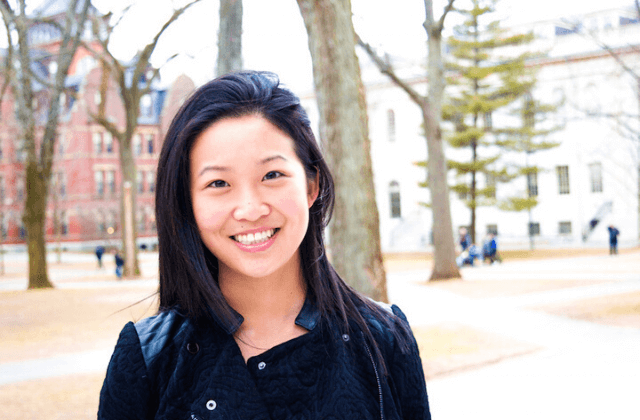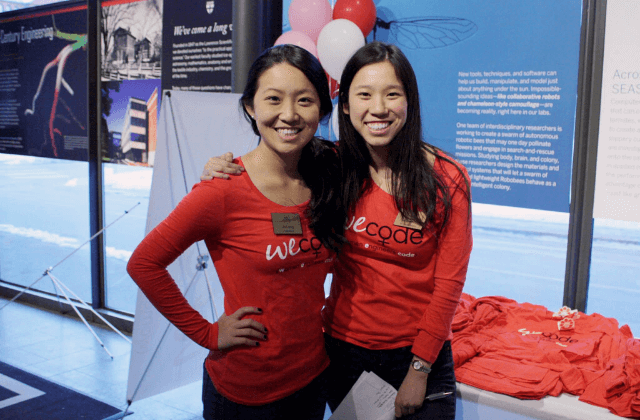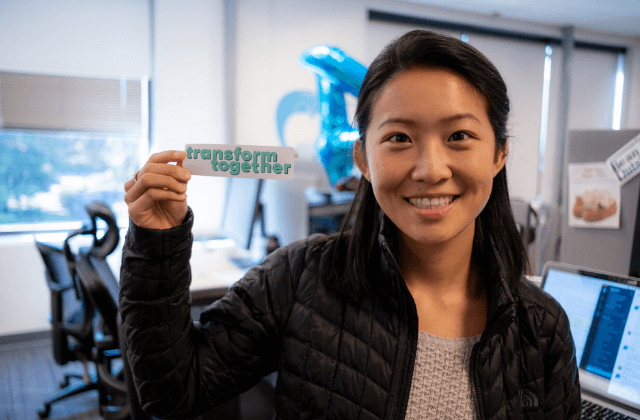As the daughter of a physician, Jiayun Fang thought pursuing a medical career would be the best way for her to make a positive impact on people’s lives. But while she was a Harvard undergraduate, a summer internship completely changed her perspective.
She interned at the Bangalore, India, office of Jana Care, a startup that was developing an app to help diabetic patients monitor health indicators and manage their diets. Using the few coding skills she had at the time, Fang built a spell checker to make it easier for users to input the foods they ate, and helped sync encryption between the mobile and web applications so individuals could easily share their sensitive health data across their devices.
“Being in the field and thinking about patients and their needs in a different context was significant for me,” she said. “I saw how computer science could intersect with health care to bring about change in developing communities. It was so cool to me that I could help improve people’s lives using just two semesters of coursework, rather than 10 years of medical training.”
She opted to concentrate in computer science at the John A. Paulson School of Engineering and Applied Sciences, but wanted to do more than build clever apps and design sleek gadgets. Fang found an ideal way to make an impact in Harvard Women in Computer Science, where she joined forces with peers to help attract more women and underrepresented minorities to the field.
Fang and Irene Chen, A.B./S.M. '14, at the WECode conference in 2014. (Photo provided by JN Fang)
Fang helped launch the inaugural WECode (Women Engineers Code) Conference and, as WiCS co-president during her junior year, co-founded the WiCS Advocacy Council that provided input to computer science faculty members on fostering a welcoming and inclusive environment.
“Computer science is a rapidly growing field, both in the demand for talent and how much it has infiltrated everyone’s lives on this planet. I felt strongly that the opportunity to build those skills and contribute to this tech ecosystem should be equitable,” she said. “Approaching that issue by focusing on representation of women in computer science was a great way to tackle it head on.”
She also continued to work at the intersection of technology and social impact. As an intern with Microsoft New England, Fang helped build an app in collaboration with the City of Boston to collate city resources and provide easy access for residents.
And during a wintertime trip to Peru with Developers for Development, she built an app to help community health workers tracks patients’ tuberculosis medication regimens.
Fang at a Coursera make-a-thon. (Photo provided by JN Fang)
Those experiences affirmed for Fang that she wanted to work for a mission-driven company, so she joined Coursera as a software engineer. She was inspired by the firm’s focus on using technology to increase access for people who may be otherwise unable to earn the credentials and degrees they need to advance their careers.
While Fang works on back-end engineering of the platform, her work is forward facing. She develops the system that tracks learner progress through grades and builds the guidance and motivation products that leverage machine learning.
“The biggest challenge is having a birds-eye view, but also balancing the nitty-gritty work of the actual coding,” she said. “As a software engineer, I’m writing the code that is the product the company is trying to sell right now, line by line. But I also need to be thinking years into the future about the foundation I should be building now to support what may be coming down the road.”
Fang backpacking in the Alps. (Photo provided by JN Fang)
For instance, Fang and her colleagues are finishing a new product that enables them to use web sockets, a new piece of technology that streamlines two-way communication between the client and server.
That new technology, which didn’t exist when the product was first developed, has allowed them to enhance the course coaching feature, which provides helpful pedagogical tips to motivate users as they work through the content.
Fang enjoys the opportunity to immerse herself in the newest technologies and work in a place where learning and growth are valued. And building off her passion for using technology to make an impact, she draws inspiration from the stories of Coursera users who have been able to change their lives and achieve their dreams by using the platform.
“Just knowing that, at the end of the day, my code is supporting learners and helping deliver that life-changing educational experience is incredibly rewarding,” she said.
Press Contact
Adam Zewe | 617-496-5878 | azewe@seas.harvard.edu



